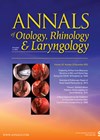
Journal Reviews
Newborn sensorineural hearing loss – what is the incidence?
In the last two decades, the introduction of newborn screening for hearing loss has dramatically lowered the average age of newborn hearing loss diagnosis to around two to three months of age. The benefits of early diagnosis are manifold, enabling...
Sudden sensorineural hearing loss – who will get better?
Idiopathic sudden sensorineural hearing loss (ISSNHL) is a rare but potentially devastating condition. For patients presenting with this condition, prognosis is of paramount importance. Wu et al begin to address this issue by retrospectively studying 17 potential prognostic factors for...
Cochlear implantation in asymmetric hearing loss
Criteria for cochlear implantation (CI) is a constant topic of debate. The UK traditionally had relatively restrictive guidance, although this has been greatly improved by more recent guidance released in 2019. Nevertheless, because of the lack of evidence for cost-effectiveness,...
Paediatric idiopathic sudden sensorineural hearing loss
This Turkish retrospective study looked at the radiological and clinical characteristics, prognostic factors and treatment outcomes in children diagnosed with idiopathic sudden sensorineural hearing loss (ISSNHL). Forty-eight children were included over an eight-year period. Complete recovery (CR) was achieved in...
Round window niche drilling with intratympanic for ISSHL. A new option for salvage?
This paper from China compares the technique of widening the round window via a posterior tympanotomy approach and steroid-soaked gelatin sponge with intratympanic steroids alone for salvage therapy in severe idiopathic sensorineural hearing loss. Salvage therapy was defined as patients...
Oral versus oral and intratympanic corticosteroid treatment for sudden sensorineural hearing loss
The 2012 American Academy of Otolaryngology- Head and Neck Surgery Foundation (AAO-HNSF) clinical practice guidelines on sudden sensorineural hearing loss (SNHL) have two statements that address steroid use. Statement eight indicates an option to offer corticosteroid as initial treatment for...
Is there a role for hyperbaric treatment in sudden hearing loss?
Sudden sensorineural hearing loss is a common presentation to ENT departments with a significant difference in management both at a local and regional level. The authors seek to clarify the role of hyperbaric oxygen therapy in combination with oral and...
Should intratympanic steroids be the first line treatment for sudden sensorineural hearing loss?
This article looked at whether intratympanic steroids (ITS) provide more benefits over systemic steroid therapy (SST) as initial therapy in patients with idiopathic sudden sensorineural hearing loss (ISSHL). This meta-analysis study, based on published RCTs, concluded that ITS treatment exhibited...
Cochlear microphonics in children
Cochlear microphonics (CM) are generated mainly from outer hair cells and are routinely tested in children with hearing loss in some parts of the world. In this retrospective study, the aim was to compare the cochlear microphonics features (mainly CM...
Recovery rates in sudden sensorineural hearing loss
Sudden sensorineural hearing loss (SSNHL) is most commonly idiopathic, and is seen relatively frequently in ENT practice. Recovery spans a period of around 1-2 months, and ultimate outcomes are highly variable, from complete recovery to no detectable hearing. Although the...
New diagnostic criteria for Ménière’s disease – an international consensus
Most readers are familiar with the American Academy diagnostic criteria for Ménière’s disease (MD) but a significant minority will be aware of other criteria from Japan and Korea. This new effort is a collaboration between these three bodies and the...
Leptin has no role in idiopathic sudden sensorineural hearing loss
This paper from Turkey claims to be the first study dealing with the relationship between leptin and idiopathic sudden sensorineural hearing loss (ISSHL). I remember leptin being a fashionable topic in obesity research, when leptin deficiency was thought to be...

















